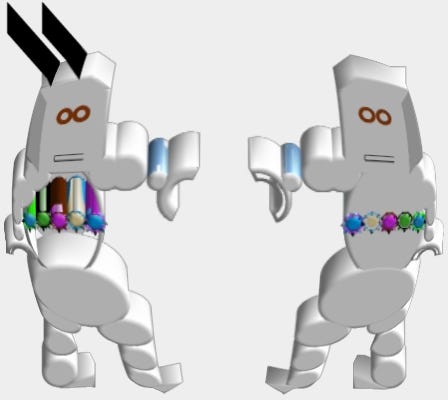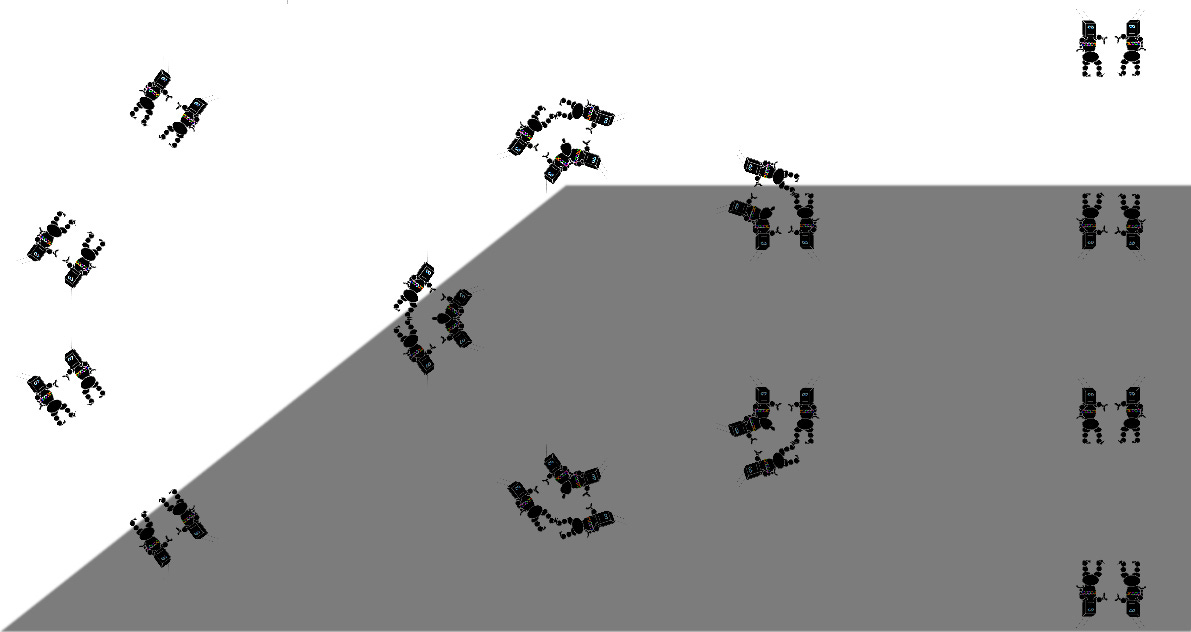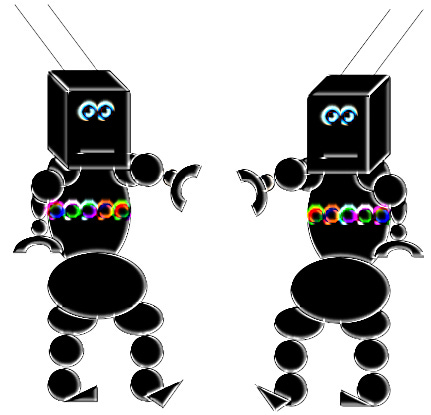I Am Not An AI Chatbot... or am I?
Robots, GPT and the Enlightenment
Once upon a time, in a world not so long ago, there were no robots.
There were no neural networks, no deep fakes, no GPT language models, and no artificial intelligence.
Of course, there were people who were deep fakes, people whose intelligence was incredibly artificial, and people whose speech undoubtedly was pre-trained and robotic. But they were, generally speaking, politicians, professors, news anchors, lawyers and movie stars (or combinations thereof), so hardly the normative yardstick.
This is difficult for anyone born in the 21st Century to believe: not more than a couple of decades ago, you could safely assume that everyone you dealt with was a human being! The man or woman you spoke and interacted with, just like today, might well have been a huckster, an impostor, a charlatan, or even a government agent. But you were speaking to a real flesh and blood huckster, impostor, charlatan or government agent, not the verisimilitude of one.
Now, it's not so simple. You could be dealing with a robot. Or you might be a robot. It's really hard to tell.
On the corporate side, they always want to be sure that I am not a robot. In pre-cryptocurrency days, robots didn't have "money" and people did. That is why the corporations and their owners needed to verify that you were "human" to make sure that you had money they could extract from you and transfer to them. They didn't really care whether you were actually human, so long as your credit was good and that you had the "free will" to legally bind yourself to the contract of adhesion and the six thousand page Terms of Service that were constantly changing whenever they liked, that no one reads and that no one can possibly understand. That's why they invented the "captcha" tests.
In the beginning, the captcha tests were simple: you just clicked "I am not a robot" in response to a prompt and voilà, you were not a robot! But the spammers and bots were clever and found it easy to surmount the barrier. So soon the tests became more complicated and the digital security arms race was on.
The captcha proofs evolved into more challenging "Turing tests" designed to prove that you were what you claimed you were. But as the tests became more sophisticated, they also became more frustrating. The matrix of images might have seemed like a good idea -- select all pictures of cross walks, or traffic lights, or buses, for example -- but the human mind proved more complicated than the tests. According to my state driver's education test booklet, every intersection is a cross walk. So was every image of a street corner a cross walk, with or without zebra stripes? As for traffic lights... did that include pedestrian and bicycle signals? Or amber flashing construction site warnings? Or blinking auto turn indicators? And as for "buses," did that query include just a piece of a bus (like the rear-view mirror), old VW micro-buses, three bench family station wagons, serial and parallel computer interface buses, a couple smooching in the park, or a waiter cleaning restaurant tables?
If you think about this too much, your multiple fails trying to prove that you are not a robot will provoke the digital gate-keepers to conclude that you are, and you will be locked out.
Perhaps that is for the best.
After all, possibly the ideal way to prove that you are not a robot is not to take these tests, because no one but a robot (or a sphex) would continue to submit to them as though it is really anybody's business to prove that you are human by making you think robotically.
The better line of inquiry, therefore, is not whether you or I are human, but whether those who create these tests are robots. It's like the infamous experiments of Yale social psychologist Stanley Milgram in the 1960s who devised "shocking" experiments to prove that obedience to authority will override your autonomy and sense of personal responsibility. There was a barely repressed glee, I remember from college days, as my professors lectured us about how obedient test subjects became during the Milgram experiments. I must have been a bad student because their lectures caused me to learn a different lesson. I questioned not just the psyches of the tested, but the psyches of those who devised, conducted and exultantly preached to us about these sadistic tests.
Indeed, history shows that even more horrible Milgram experiments have been, and continue to be conducted, on very much larger scales on unwitting (more or less) populations. That awareness causes me, again, to question both the character of those who so readily submit to authority as well as the psychopathy of the social engineers who enjoy making others submit.
Nevertheless, we are living in the 21st Century where, to an ever increasing extent, just to survive in modern society, we are obliged to undergo one test after another to prove that we are compliant, and, therefore, a "human."
Hmm.
Thus, beyond the original "captcha" test of simply declaring your humanity, "better" tests have evolved. A more sophisticated Turing test might ask you to select from a pallette of images showing different well known national and international financial institutions. You might then be asked to "select all banks that are solvent."
Now a computer would be able to figure this out by rapidly browsing the available data base of propaganda and marketing shtick. It would then conclude, like our Treasury Department has assured us, that all banks are completely safe and sound. By contrast, any half-way sentient human would immediately understand that the Treasury Department, like all federal agencies from the State Department to the Pentagon to the CIA, is itself populated by bots and no banks anywhere are solvent. Thus, why waste one's time with such an idiotic query?
I propose, therefore, more meaningful tests to distinguish humans from robots. Consider this puzzle, for example:
Which penguins are doing the latest TikTok dance craze?
A robot might scour the Web looking looking for what music young people are listening and dancing to these days. After searching billions and billions of records and images, a robot would conclude that one or more of this arctic flock is a two-minute TikToker strutting his/her/its stuff (depending on the penguin's choice of gender) in a group selfie.
A human, however, would immediately recognize that these are not penguins at all and they are not engaged in a dance craze. Rather, these are crazy Republican and Democratic Congress critters (if you look closely you can see the front zippers on their fake penguin costumes) masquerading as penguins and choreographing a "bipartisan" anti-TikTok smear campaign. Why? Because young people dancing and having so much creative fun without (U.S.) government prying is more than grandstanding politicians, monopolistic corporate media and authoritarian state surveillance agencies can tolerate.
Or, consider this test of your humanity:
The protesters shown above oppose Emmanuel Macron's executive order increasing the French Retirement age from 62 to 64. Select all who are police infiltrators and government provocateurs.
Now before we get into the mechanics of this particular captcha test, we need to address some threshold questions whether you are a human or a robot. The initial question, of course, is do you know where France is? If you do know where France is located, then you might be a robot. But if you do not know where France is, you might just be a stupid robot. If you do not know where France is, then you might also be a human. The exact kind of human being who cannot locate France, however, is a separate issue for another essay on another day.
The second threshold question is whether you are even aware of the months-long demonstrations against the Macron administration. Again, an "intelligent" robot might "know" about the protests because the information can easily be harvested from the Web. A human, however, may or may not know, depending on where the human lives (within or without the Anglosphere, for example), what sources of "news" (so called) the human is fed, and whether the human actually wants to know. Thus, in the United States, information about the French peoples' efforts to either have Macron's retirement age diktat revoked or to overthrow his administration altogether, or even general information about the French revolutionary tradition, is relegated to third-tier news somewhere below Donald Trump's arrest, the Kardashians' love life, pro athletes' trash talk, cute animal videos, or no news at all. Again, ignorance about what is happening in France might or might not prove that you are human versus a robot, albeit in either case, a poorly informed one.
The third threshold question is your visceral reaction to the French protesters. A human who has empathy will react positively to the French protests. After all, the empathic human will reason that what Macron is doing to French workers is the equivalent of stealing from Social Security or raising the American retirement age to "save" the fund by ensuring that more of us will die before we ever receive payments.
A less empathic human, however, regardless whether of the worker or ownership class, will either yawn at the French protests or feel downright hostility, because in a jealous and un-class-conscious way, the unempathic human would rather drag everyone down to the lowest common denominator; i.e., if I have to work until the day I die, then so should everyone else. Remember, we are, at this level, not testing for whether you are a rational human or a socially aware human or even a "nice" human. We are only examining whether you are human by whether you have any visceral reaction at all to the grievances of other humans.
A robot, by contrast, will have no visceral reaction to the image of the French protests because, after all, it has no viscera. However, a visceral reaction could be feigned by a so-called "intelligent" computer program such that the robot might appear to have a visceral reaction to the French protests, or, at least, visceral enough to fool you into thinking it is not a robot.
Ergo, our captcha test using the French protesters.
A modern computer program could, theoretically, pass this captcha test by facially recognizing all of the demonstrators, sorting them by phenotype, mapping them by bone structure and cartilage and distinguishing characteristics, correlating their images with their government files and, thereby, determine who were the government agents. Of course, the computer program couldn't actually disclose that information to anyone without a security clearance. A "proper" computer (that is to say, one that complies with western surveillance protocols), is "properly" programmed through "backdoors" mandated by the State to keep the really important stuff secret from everyone who doesn't already know the really important secret stuff.
Thus, a "good citizen" computer program, properly pretrained through the backdoor, would lie and falsely respond that none of the people shown in the above picture are infiltrators or police provocateurs. You and I would be none the wiser whether a lying "good citizen" computer, or a lying "good citizen" human (or a police infiltrator) had responded.
You could, of course, instantly prove that you are "real" by refusing to participate in such a ridiculous test.
No human being... at least no self-respecting human being in his or her right mind... should spend any time at all trying to solve this difficult and demeaning puzzle that, if answered correctly, might land you in prison alongside Julian Assange.
If you are a self-respecting, human who has not been programmed through any super secret backdoors, you would just say no. You would refuse to interact with or do business with any entity or organization that would subject you to such a degrading and potentially dangerous waste of your time and resources. By submitting, you prove that you either have no self-respect or you are not in your right mind or you have no autonomy or that you just think you are human when you really are not. Honestly, these are important existential questions you ought to ask yourself because the lines are blurred.
Does the computer program "think" like a human... or do humans "think" like computers? Might it be all the same? Is it species-centric hubris to insist that "human intelligence" differs from "artificial intelligence?" If animals think and experience pain and pleasure and emotions and intelligently make choices like we do, are we really different from any other animal but for our enhanced abilities to coordinate, analyze and communicate our intelligence to others and to the future?
As we ask these questions, we turn to GPT, or generative pretrained transformer programs.
ChatGPT is the tech buzz du jour. That buzz you hear either signals that it is important or that you are being swarmed by flies and mosquitoes, in which case it would be better described as degenerative pretrained transformer programs.
That buzz means either something important is happening or that you are being swarmed by flies and mosquitos.
ChatGPT started out as an "open source" enterprise, but it now is a proprietary venture funded by some of your favorite plutocrats. That, in itself, should give you pause. If not, go back and take the two captcha tests above to determine whether you really are a human.
Unlike a captcha test, ChatGPT is not intended to determine whether you are a human or a bot. Rather, using generative pretrained transformer programs, GPT can be used to convince you that what responds to your written inquiries is a human; or, at least appears to think or behave like a human.
Transformer neural architecture crunches very large databases to "learn" and then, by assembly of what it has gleaned from databases, interact with people in writing. Notwithstanding all the hype, ChatGPT is not the embodiment of the sentient, talking, listening (and mentally disturbed) HAL 9000 in the Stanley Kubrick movie 2001. Well, ChatGPT, and/or its human promoters, might well be mentally disturbed, but that, too, is a topic for another essay at another time.
The written interactions of ChatGPT seem, more or less, human. Sometimes. At first glance. This could be an innovation for computers, or not. After all, we already know a lot of people like this. The innovation, we are told, is that ChatGPT can cobble together a selection of written words and phrases that read as sensibly as, well, Democratic Vice President Kamala Harris, Republican Senator Lindsay Graham or any number of state and local politicians of all political stripes. So, if you mentally assimilate the usual sound bites of network TV news, and if you dutifully "follow" the memes of social media, then this "innovation" is made for you.
Is ChatGPT the "next big thing?" Investment interest has fizzled in such fizzy things as crypto exchanges, non-fungible tokens (NFTs), and even the fashion of annually upgrading your smart devices for the latest shiny gizmo. Investors need froth and, perhaps, Chat GPT is the "next big thing" that will keep the stock markets frothy. Exactly what this "next big thing" is really good for is less clear. This much is obvious: 1) you are expected to join the crowd by buying into this tech phenomenon (whether you understand it or not) just like the "big boys" are doing, 2) it is designed to facilitate "cheating" by simulating human conversation in a context where you really aren't paying attention, and 3) it mostly is intended to (further) emancipate the ownership and investor class from the need to employ human labor.
The fact that there appears to be conflict within the tech and investor world about the wisdom, existential threats and capabilities of generative pretrained transformers does not actually confirm that it is or is not wise, a threat or even capable. Like any other controversy ginned up by Hollywood or political spinmeisters or the infotainment world, controversy sells. Just like R and X-rated movies, the hype about block-chain, pet rocks and the marketing of Segway self-balancing two-wheel scooters, ChatGPT and its sibling programs might be nothing more or less than another self-promotion campaign, notwithstanding the apparent fissure in the tech community.
We hear teeth-gnashing and wailing and see folks rending their clothes about all the jobs that will be lost to the likes of ChatGPT. Is that true or just part of the marketing hype?
The ownership and investor class has always sought to free itself from having a "payroll." It is the original wet dream of the ruling class. Wages and benefits are always the biggest bugaboos of business and labor's demands for safe and fair working conditions are always deemed a "nuisance" for owners or investors. Workers, to put it simply, are a drag on profit and, therefore, something to be eliminated. Profit can be increased if fewer "useless eaters" (in the pluts' august opinion) are employed.
Better still - hearkening back to the Milgram psycho-social experiments discussed above - if you can be trained to demand medical care by computers rather than live human docs; or that you prefer to learn from GPT teachers and professors rather than human ones; or that you insist on a GPT lawgiver rather than a real judge or lawyer; or submit to doing business with GPT customer service representatives rather than flesh and blood ones... then how can you possibly complain about the further reduction of your life expectancy and the further degradation of the quality of your life?
You will think you need GPT. You will demand it. And you will get it. That's how modern socioeconomic marketing works. Likewise drug addiction. Likewise suicide.
And, who knows, the generative artificially intelligent programs might well produce writings no less insightful than the stuff that many lawyers, academics, judges and university professors already churn out. The scuttlebutt is that GPT programs have already fooled college and professional school profs into giving passing grades to generative pretrained transformers.
But that might be just a doleful comment on the intelligence of those professors rather than an endorsement of GPT.
Those of us from an earlier century recall the buzz of behaviorist B.F. Skinner's experiments with rats (and people) by which operant conditioning, using negative and positive reinforcement, could train animals (and people) to be, more or less, a pack of Pavlovian dogs yammering and slobbering on command. Commercial and political advertising works the same way.
Flash a photo of your favorite bogeyman before the eyes of of any card-carrying Democrat or Republican and you will get the idea. Folks have been conditioned to have similar Pavlovian responses to an ever-changing kaleidoscope of foreign leaders, religions, nationalities, cultures, political-economic-isms, phenotypes, accents, etc., etc., etc.
It's all very much à la George Orwell's 1984 and it's the way all supposedly "civilized" societies (including, and especially "managed democracies" like those of the western industrialized states), now and in the past, deliberately have been chopped up, infantilized, tribalized, trivialized and manipulated to manufacture consent for what is not necessarily in society's best interests.
The Romans understood that to rule the world, it was essential to set everyone else at each others' throats. Divide et impera - divide and conquer. The so-called Pax Romana was less a formula for empire through world peace than a formula for world empire by chopping everyone else into tiny pieces.
The West (which is no less colonialist today than it was in the 18th and 19th Centuries) has, for more than half a century, applied the same divide et impera policy of divide and conquer to every "hot spot" it has instigated around the globe. Domestically, of course, it has done the same to its own citizens to achieve the same result.
Whereas B. F. Skinner sought to condition physical reactions to specific stimulus, modern society has now evolved to the stage where your own intelligence, your own emotions, and your own opinions can be shaped, conditioned and manipulated to respond to specific stimulus. A deliberately cultivated Stockholm Syndrome of learned helplessness leads us to identify with our oppressors. See the above comments about the unempathic human who disdains the French protesters because, damn it, if I have to work myself to death, then everyone should! That kind of learned helplessness, makes us bitter. It causes us to flee brutal reality for the distracting entertainment of the circus, the artificial world of the Metaverse, the seduction of consumerism, the puberty blocking and fentanyl culture drugs of Western Civilization.
If it does not make you robotic, it does dehumanize you.
We all like to believe that we think for ourselves, that we form our own opinions and that we have our own unique perspectives. We think we love and hate what we love and hate because of our free choice alone. In sum, we believe that we are ourselves and we are not manipulated.
Except that we are manipulated, even in the belief that we aren't.
It simply is not possible to think for one's self without information, straight, unadulterated and unfiltered. It is impossible to think for one's self without effort. It is impossible to form one's own opinions when we are incessantly fire-hosed with high pressure propaganda and misinformation.
The message of the Enlightenment of the 17th and 18th Centuries - the Enlightenment that birthed both the American Bill of Rights and the French Declaration of the Rights of Man (Déclaration des droits de l'Homme et du citoyen de 1789) - was that every human being was capable. Everyone could understand. Everyone could think for him and herself. Everyone was intellectually free.
The insight of the Enlightenment of the 18th Century was supposed to be immutable and universal. But it has been pared down to almost nothing in the 21st.
"You've come a long way, baby!" Which, to make a point, was a marketing slogan of the late 1960s used to sell cigarettes to women, as though smoking cancer sticks was an act of sexual equality and emancipation.
Thus we circle back to another purpose of GPT, which is to facilitate "cheating" by faking apparently intelligent writings in a context where you really aren't paying close attention. It does this, in a sense, by scouring massive databases and generating synthetic combinations of words and phrases it has gathered so that, to someone who isn't paying close attention, its written words might seem as intelligent as those written by a human. But it's an illusion. Or is our intelligence the illusion?
It's an illusion. Or is our intelligence the illusion?
If I am not paying attention, the fact that I might be easily fooled by a generative pretrained transformer program might say more about me than it does about the cleverness of the program. The machine pastes together something that seems to make sense. It might combine and integrate related phrases so as to even appear original. It's like a fancy, robotic parrot.
But if I cannot tell whether what I have read is the product of a generative pretrained transformer, then, perhaps, I am also a generative pretrained transformer. It might be a robot parrot. Am I as well?
René Descartes famously said in the 17th Century, at the front end of the Enlightenment, "Cogito ergo sum." That more or less means that to be human is to think, to be aware and truly to understand. GPT may or may not "think" in the same way that humans do. Or does it, in the sense that we, too, are also generative pretrained transformers? As Zhou Enlai said of the long lasting effects of the French Revolution, "It's too soon to tell."
I am not an AI chatbot.
Or am I?
An AI chatbot could not have written this essay.
Or could it?
It's too soon to tell.
Photo Credits:
1Ministerio de Cultura de la Nación, Creative Commons Attribution-Share Alike https://commons.wikimedia.org/w/index.php?search=penguins&title=Special:MediaSearch&go=Go&type=image Grid insert with Gimp
2 Manifestation contre la réforme Borne des retraites Author: Roland Godefroy 19 January 2023, Creative Commons Attribution-Share Alike 4.0 International, https://commons.wikimedia.org/wiki/File:Paris-2023-01-19-manif-retraites05.jpg Grid insert with Gimp







